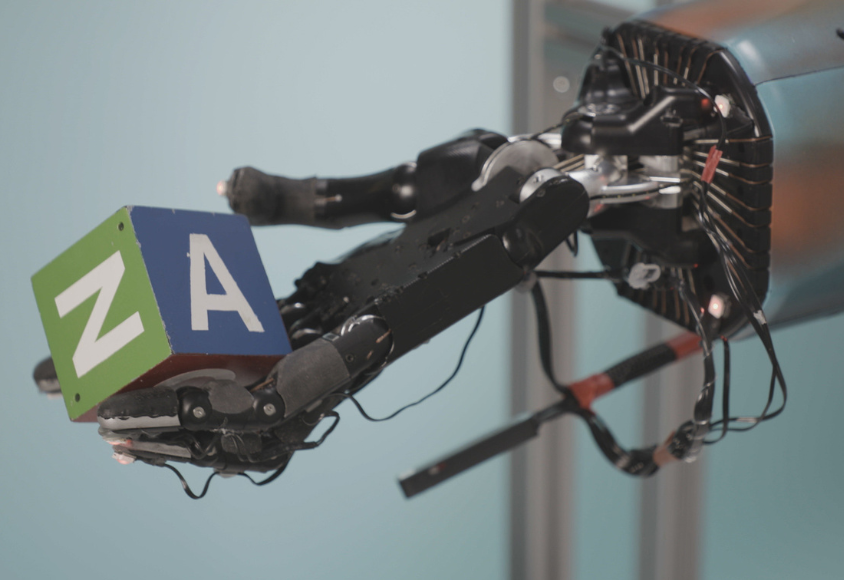Digital transformation: progress for all, not for the few
Listen to the essay here:
Author: Henning Tillmann
When debating the challenges of the digital world, too often we fall short in our attempt to comprehend the issue at hand. Instead of focusing on technical obstacles, we need to strengthen our core values of freedom, justice and solidarity. This change will be difficult, but speaking up now to protect people could make the digital world more advantageous for all, instead of just a few.
We are on the cusp of a digitised world in which exponential growth will be the new normal. As a society, we need to be prepared for this future. This is why we need to foster a paradigm shift towards digital transformation. While digitisation refers solely to the conversion of analogue information into a digital format, digital transformation is by far the more challenging task that could result in a greater benefit for society. This means that a poor analogue process will remain poor if it is only digitised – or become even worse.
When we aim for a digital transformation instead, we analyse the problem, define a goal and develop a tailored solution from scratch. Take schools for example: digitisation means converting books into PDFs. By contrast, digital transformation means rethinking how education can be elevated into the digital world – by using interactive elements, adjusting to individual strengths and weaknesses and distributing information freely.
Securing freedom is the biggest task of the 21st century
Digital tools and a digital lifestyle can enable mass surveillance in a way that was never imagined before. China is not the only country to have an almost seamless system of monitoring its citizens. In many Western countries too, infrastructure that could become a major threat to civil liberties is slowly being established.
A recent example is the US Supreme Court overturning the landmark decision of Roe v. Wade. With the removal of the right to abortion and the announcement by some Republican lawmakers that they intend to prosecute women seeking abortions, period-tracking apps have been uninstalled by many women. The apps' highly sensitive data could potentially reveal information about whether a woman has had an abortion.
Civil liberties in the digital space are also being increasingly dismantled in the name of public safety. Data retention laws, which can facilitate the creation of seamless movement profiles for all citizens through location data, have been passed by many countries over the past fifteen years. Fortunately, the European Court of Human Rights has already stopped those attempts multiple times. But for how much longer?
These incidents show how freedom must always be considered when we shape the digital transformation. Politics must not see fundamental rights as an obstacle in the digital sphere, but rather as the backbone of our society. Too often, as in the case of data retention laws, valuable time is wasted on misguided approaches that eventually fail in court.
Yet freedom and security do not need to be in competition, as the digital think tank D64 (2022) has shown with its concept of the login trap. The login trap as a digital transformation approach would make efficient use of existing processes for acquiring only relevant data – instead of storing data from everyone, as in the previous digitised approach.
Equal justice through digital transformation
Whether computer systems, especially those using machine learning (often referred to as Artificial Intelligence or AI), perform fairly or unfairly depends in large part on their training data. These systems need vast amounts of mostly labelled data to train neural networks to identify recurring patterns. If skin cancer software is trained only with photos of people with light skin, it will have trouble recognising cancer in dark skinned people. So, in effect, it is possible to create racist artificial intelligence.
On the other hand, if the same software is trained with different, balanced data, it could come to completely different decisions. Checks and balances are therefore needed to ensure that appropriate systems are equipped with data that is as nondiscriminatory as possible. The verifiability and documentation of the learning units should be made mandatory for government systems. Minorities must not be disadvantaged through misguided AI. Policymakers must also create legal obligations for private systems so that the principle of equal treatment continues to be guaranteed in the future.
Furthermore, media literacy, abilities for evaluating internet content and the ability to deal with the internet in a socially acceptable way are part of basic democratic education.
Solidarity matters
Many activities that could not be automated in the past will be able to be automated in the future. Digitising existing flawed processes would mean cementing outdated and inefficient structures. Some people would benefit financially, while many would suffer from surveillance, permanent work overload or from excessive demands that are damaging to health.
The digital transformation, on the other hand, could facilitate enormous social progress. For this to succeed, the general social benefit needs to be increased. A social, progressive society should primarily be concerned with protecting people through a just transition. In this respect, Scandinavian countries lead the way with their guiding principle of “protect people, not jobs”. A changed workplace, new work processes or the increasing intensity of communication between internationally connected colleagues do not necessarily have to place an additional burden on employees if they are handled properly.
Furthermore, the right to public data needs to be established. Open Data and “open by default” must become basic principles for data at local and federal state authorities. Companies must also be encouraged to make data available for public use.
Strengthening core values
The terms digitisation and digital transformation seem so similar, yet they result in fundamentally different outcomes. Fundamental values in our society are facing new challenges as a result of digitisation, especially AI systems. Nevertheless, the advantages of a digital world clearly outweigh its disadvantages. Yet, we should swiftly adopt a paradigm shift towards a digital transformation mindset for the greater benefit. Society and policymakers need to move fast – assisted by experts from science and civil society, i.e. people without a commercial interest. Through intelligent concepts and an approach that safeguards the fundamental values of freedom, justice and solidarity, the prosperity of all can be increased.
Henning Tillmann (@henningtillmann) is co-chair of D64 – Zentrum für digitalen Fortschritt e. V. (Centre for Digital Progress).
Bibliography
D64 – Zentrum für Digitalen Fortschritt (2022): Die Login-Falle: Strafverfolgung im Internet ohne Massenüberwachung, https://d-64.org/login-falle.



